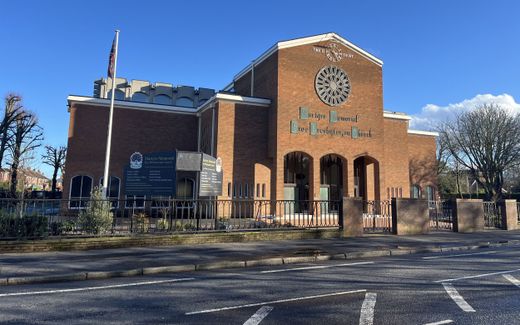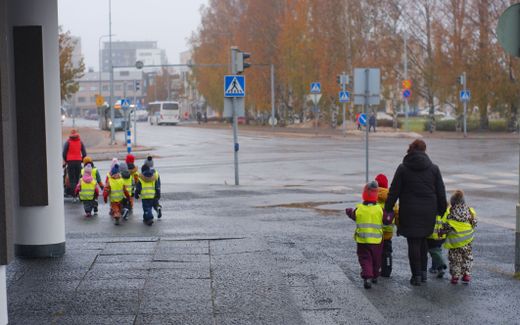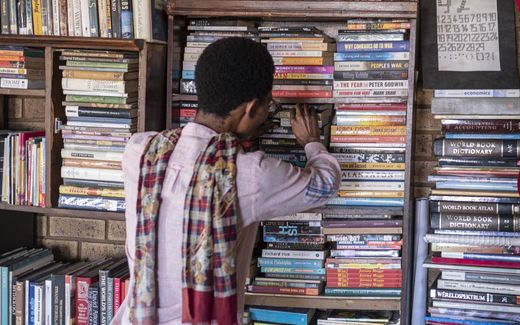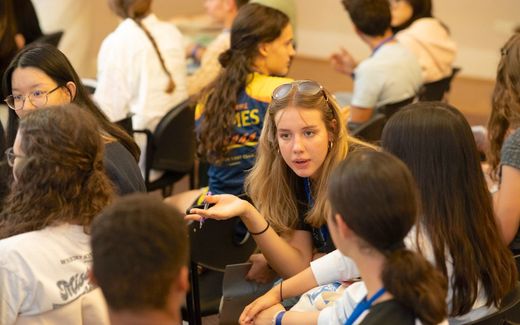Biblebelt feature: Reformed school in Northern Ireland has to pay its own bills (2/2)
30-04-2024
Western Europe
Kees van den Brink, RD

School children in Belfast, Northern Ireland, Britain. The children are not part of the schools mentioned in the article. Photo EPA, Mark Marlow
Western Europe
That Northern Irish Protestants are royalists is evident in the Independent Christian School in Newtownabbey, a northern suburb of Belfast. On the wall in the corridor are collages with crafts about the coronation of Charles III, now almost a year ago.
The 1983 school is one of seven that emanate from the Free Presbyterian Church of Ulster (FPCU). The administrator of the Newtownabbey school is Rev. Brian McClung, pastor of the FPCU congregation in the adjacent church building and also chairman of the board of the seven schools. His wife, a teacher of children aged 4 to 11, is in charge of the day-to-day running of the school.

The school's 41 pupils can be found behind different doors this Wednesday morning. In one classroom –the same one where the 30-minute day opening for the whole school takes place every morning– teacher McClung and her 14 pupils are sitting, neatly dressed in a green-and-blue school uniform with striped tie. It is quiet; each child has its own program.
Behind another door, pupils aged 12 to 14 receive physics. The "science room" is equipped with special physics and chemistry tables. Another door opens access to the adjacent church. At the back of the church hall, up a flight of stairs, another flight of stairs, and there, high and dry in a small workspace, sits one pupil. At 16 years of age, she is the oldest in the school. Today, she is busy self-studying French. She has since taken several so-called A-level exams, which give access to university.
Part 5 of a series of European Biblebelts. Earlier editions were about Finland, Sweden, Germany, and Denmark
Parents have to be willing: per child, they pay 177 pounds (over 200 euros) a month to the school, according to Mr. McClung. On top of that, the school itself has to raise 15,000 pounds (17,500 euros) a year in funds to pay salaries. Even then, teachers here earn less than half of what they might get in state schools, he says. "Many of our teachers do this work to serve the Lord," he says.
Religion class
Every five years, the school receives a visit from the inspectorate; the last time was just three weeks ago. This never causes any problems, says McClung. "They do always suggest that we should use more modern teaching methods."

The inspector visited a religion class taught by the pastor himself. "I had all the students read a verse from 2 Kings. The inspector commended them for their reading skills. My wife told him that in the last 15 years, not one student had left the school failing their maths. He could hardly believe that. In state schools, there are many pupils who have problems with English or mathematics."
Christian character
Partly because of costs, by no means all FPCU members send their children to their own schools. Moreover, state schools in Northern Ireland still have a rather Christian character due to an arrangement from the 1940s. Protestants then handed over the management of their schools to the government in exchange for funding and church influence over education.
Mr. McClung does not see this as a positive. "We pay a price, but we can set our own educational curriculum. We do not teach religious studies as prescribed by the state – filled in by the four largest churches in Northern Ireland." So, the school provides its own content, with the restriction that only FPCU members are allowed to teach the religious subject. Teachers from other denominations are appointed for other subjects, however.
Having your own school is not just about religious lessons, argues McClung. "Why do our children need to learn English? To be able to pray and read the Bible. In history class, it's about the worldview you impart: the world belongs to God."
This article was translated by CNE.news and published by the Dutch daily Reformatorisch Dagblad on April 18, 2024
Related Articles






